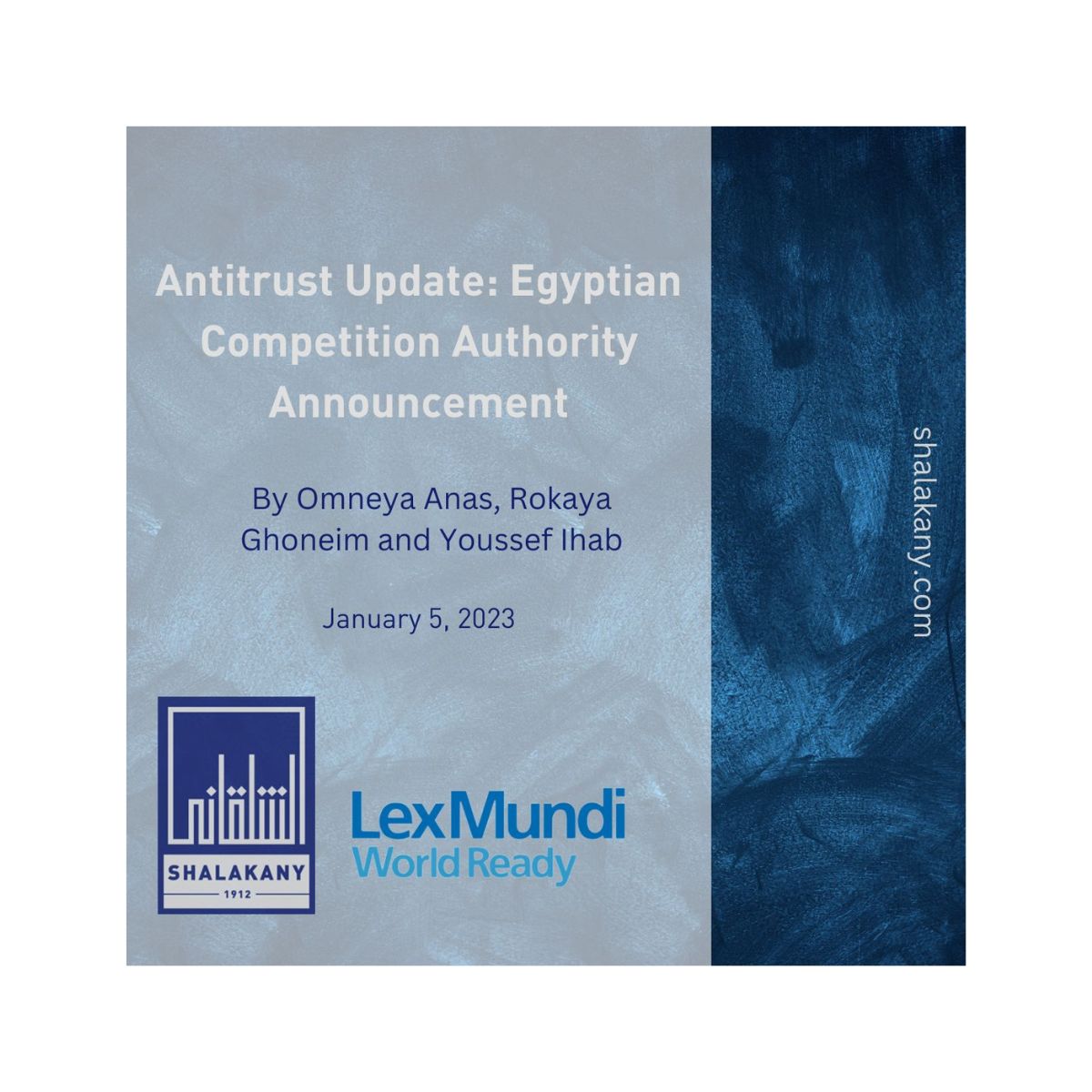
June 19, 2022
Commercial Agency Law Amendments Regarding Real Estate Brokerage
Law no. 120 for 1982 (the “Law”) has been the law regulating the registration of commercial agents and intermediaries in Egypt since the 1980s. Last April the major amendments to the Law were introduced, bringing real estate brokers (“Brokers”) within the ambit of the Law.
Law no. 21 for 2022 (the “New Law”) was promulgated after a real estate development boom started in the early 2010s, bringing with it the rise of an unregulated real estate brokerage sector. The New Law aims to regulate such sector by requiring real estate brokers to register themselves in a manner similar to commercial agents and intermediaries.
The key features of the New Law are as follows:
Registry of Real Estate Brokers
Similar to the Registry of Commercial Agents and Intermediaries, the New Law introduced a Registry of Real Estate Brokers (the “Brokers Registry”).
Real Estate Brokers are now required to be registered before undertaking their activity. The aim of the Brokers Registry is to provide a two-fold benefit: first, to act as an information collection medium that helps the Government formulate real estate brokerage policy by utilizing the said information; and second, as the listings in the Registry will be made publicly available, it will further legitimize the stature of the brokerage activity and act as a safeguard for clients and brokers alike.
The amendments in the New Law outline the conditions upon which registration may be granted. They add to the previously stipulated conditions for registration of commercial agents and intermediaries. The amendments refer to negative lists prepared in accordance with the Anti-Money Laundering Law no. 80 for 2002 and the Counter-Terrorism Law no. 8 for 2015. Inclusion in a negative list precludes a person from registration in the Broker’s Registry.
The amendments also introduce a requirement that a person successfully pass a course in real estate brokerage before being able to register in the Brokers Registry.
Further, the amendments require that juristic persons wishing to register in the Brokers Registry be headquartered in Egypt (unless otherwise provided through a special exception issued by the competent Minister). They also require that the object of the juristic person include “real estate brokerage” as one of the company’s activities, and that the paid-up capital of the company be no less than EGP 20,000. In addition, all managers, Board members, or those involved in the actual management of the company must fulfill the conditions required for individuals registered in the Brokers Registry.
Failing to register or registering using false information may subject a person to a fine of no less than EGP 50,000 and no more than EGP one million and/or a prison sentence of a maximum of two years. Moreover, the Broker may be banned from practicing his brokerage activity for up to two years.
In addition to the Registry, the New Law imposes certain obligations on Brokers, as highlighted below.
Obligations of Real Estate Brokers
The New Law regulates the content of real estate brokerage agreements by mandating some of the elements of the agreement. Of the main elements required to be included, the New Law stipulates that a brokerage agreement must be in writing and must contain its date, the name of the broker and his tax number, and a description of the building, unit, or land subject of the sale or lease. The agreement must also include the payment terms, including the type and method of payment, the date of payment and the amount to be paid. Brokers also have to ensure that the information regarding the real estate subject of the transaction mirrors the information found at the competent administrative authority regarding such property, including its surface area and description.
The New Law also requires that Brokers maintain a register in which all their brokerage operations are recorded, as well as all commissions received, the date and value of each transaction, the personal information of the concerned parties, the advances paid, and any other information required as per ministerial decrees issued in this regard.
The New Law also imposes a confidentiality obligation on Brokers, who are not permitted to disclose information received from their clients except in accordance with the Law.
Violation of any of the above obligations shall subject a Broker to a fine of EGP 10,000 to EGP 50,000.
Finally, in order to encourage cashless transactions that can be traced and monitored, the New Law prohibits Brokers from receiving any amounts above EGP 10,000 in cash. A Broker who violates this provision shall be sanctioned with a fine between 2% and 10% of the amount received in cash, with a cap of EGP one million.
Market Reaction
The Legislature identified the need to add new safeguards to the real estate sector by regulating the activity of real estate brokerage. As Ahmed Samir, head of the Economic Affairs Committee in Egypt’s Parliament, stated, the amendments in the New Law target real estate brokerage activities for “stricter” administrative oversight.
Law no. 21 for 2022 (the “New Law”) was promulgated after a real estate development boom started in the early 2010s, bringing with it the rise of an unregulated real estate brokerage sector. The New Law aims to regulate such sector by requiring real estate brokers to register themselves in a manner similar to commercial agents and intermediaries.
The key features of the New Law are as follows:
Registry of Real Estate Brokers
Similar to the Registry of Commercial Agents and Intermediaries, the New Law introduced a Registry of Real Estate Brokers (the “Brokers Registry”).
Real Estate Brokers are now required to be registered before undertaking their activity. The aim of the Brokers Registry is to provide a two-fold benefit: first, to act as an information collection medium that helps the Government formulate real estate brokerage policy by utilizing the said information; and second, as the listings in the Registry will be made publicly available, it will further legitimize the stature of the brokerage activity and act as a safeguard for clients and brokers alike.
The amendments in the New Law outline the conditions upon which registration may be granted. They add to the previously stipulated conditions for registration of commercial agents and intermediaries. The amendments refer to negative lists prepared in accordance with the Anti-Money Laundering Law no. 80 for 2002 and the Counter-Terrorism Law no. 8 for 2015. Inclusion in a negative list precludes a person from registration in the Broker’s Registry.
The amendments also introduce a requirement that a person successfully pass a course in real estate brokerage before being able to register in the Brokers Registry.
Further, the amendments require that juristic persons wishing to register in the Brokers Registry be headquartered in Egypt (unless otherwise provided through a special exception issued by the competent Minister). They also require that the object of the juristic person include “real estate brokerage” as one of the company’s activities, and that the paid-up capital of the company be no less than EGP 20,000. In addition, all managers, Board members, or those involved in the actual management of the company must fulfill the conditions required for individuals registered in the Brokers Registry.
Failing to register or registering using false information may subject a person to a fine of no less than EGP 50,000 and no more than EGP one million and/or a prison sentence of a maximum of two years. Moreover, the Broker may be banned from practicing his brokerage activity for up to two years.
In addition to the Registry, the New Law imposes certain obligations on Brokers, as highlighted below.
Obligations of Real Estate Brokers
The New Law regulates the content of real estate brokerage agreements by mandating some of the elements of the agreement. Of the main elements required to be included, the New Law stipulates that a brokerage agreement must be in writing and must contain its date, the name of the broker and his tax number, and a description of the building, unit, or land subject of the sale or lease. The agreement must also include the payment terms, including the type and method of payment, the date of payment and the amount to be paid. Brokers also have to ensure that the information regarding the real estate subject of the transaction mirrors the information found at the competent administrative authority regarding such property, including its surface area and description.
The New Law also requires that Brokers maintain a register in which all their brokerage operations are recorded, as well as all commissions received, the date and value of each transaction, the personal information of the concerned parties, the advances paid, and any other information required as per ministerial decrees issued in this regard.
The New Law also imposes a confidentiality obligation on Brokers, who are not permitted to disclose information received from their clients except in accordance with the Law.
Violation of any of the above obligations shall subject a Broker to a fine of EGP 10,000 to EGP 50,000.
Finally, in order to encourage cashless transactions that can be traced and monitored, the New Law prohibits Brokers from receiving any amounts above EGP 10,000 in cash. A Broker who violates this provision shall be sanctioned with a fine between 2% and 10% of the amount received in cash, with a cap of EGP one million.
Market Reaction
The Legislature identified the need to add new safeguards to the real estate sector by regulating the activity of real estate brokerage. As Ahmed Samir, head of the Economic Affairs Committee in Egypt’s Parliament, stated, the amendments in the New Law target real estate brokerage activities for “stricter” administrative oversight.



